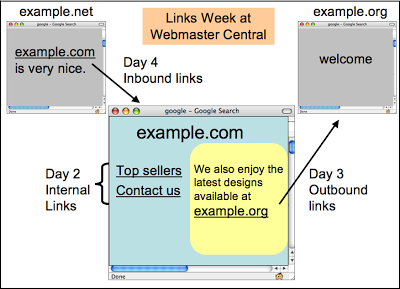Monday, October 06, 2008
We hope that you're able to focus on helping users (and improving the web) by creating great content or providing a great service on your site. In between creating content and working on your site, you may have read some of the (often conflicting) link discussions circling the web. If you're asking, "What's going on—what do I need to know about links?" then welcome to the first day of links week!
Day 2: Internal links (links within your site)
Internal linking is your home page linking to your "Contact us" page, or your "Contact us" page
linking to your "About me" page. Internal linking (also known as link architecture) is important
because it's a major factor in how easily visitors can navigate your site. Additionally, internal
linking contributes to your site's "crawlability"—how easily a spider can reach your pages.
More in
Day 2 of links week.

Day 3: Outbound links (sites you link to)
Outbound links are external sites that you're linking to. For example, www.google.com/webmasters links to the domain googlewebmastercentral.blogspot.com (our lovely blog!). Outbound links allow us to surf the web—they're a big reason why the web is so exciting and collaborative. Without outbound links, your site can seem isolated from the community because each page becomes "brochure-ware." Most sites include outbound links naturally and it shouldn't be a big concern. If you still have questions, we'll be covering outbound linking in more detail on Day 3.
Day 4: Inbound links (sites linking to you)
Inbound links are external sites linking to you. There are many webmasters who (rightfully) aren't preoccupied by the subject of inbound links. So why do some webmasters care? It's likely because merit-based or volunteered inbound links may seem like a quick way to increase rankings and traffic. Answers to your questions like, "Are there no-cost methods to maximize my merit-based links?" are provided on Day 4.
Update: Included references to blog posts as they were published throughout links week.
